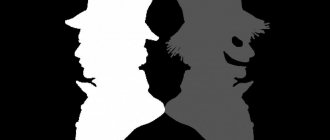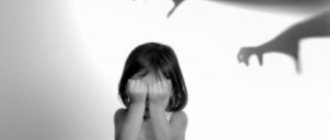Hello dear readers! Lyudmila Redkina is with you. Have you ever had the feeling that you have already been in an unfamiliar place, heard words that were just spoken, saw what you are seeing now? Sort of like “Groundhog Day”. According to statistics, about 95% experienced this condition. It is short-lived, but it stops some people for a long time. In this state, a person tries to remember whether he was in this situation before, or whether something went wrong. In this article we will understand what deja vu is and why it happens to us.
Definition and feeling
The word “déjà vu” comes to us from French, meaning “already seen.” The definition and meaning of this psychological phenomenon is clear - it is the feeling that a situation in the present time has already happened to a person. Sometimes he even knows what will happen in the next second.
Scientific definition: déjà vu is a tangible error in a person’s perception in which he is sure that a given situation has already happened to him.
Some people mistakenly think that a person experiencing this feeling can continue to predict the near future. But that's not true. American scientists have determined that a connection with a specific memory is not established, so déjà vu is described not by specific facts, but by feelings and premonitions.
How does this manifest itself? In a particular situation, you feel that you are familiar with the sounds, elements and actions of the people around you. You feel uneasy, it seems that your head is slightly dizzy or something is happening to your consciousness. In any case, the deja vu effect does not leave people indifferent.
Until recently, this phenomenon was considered a deviation, some kind of addiction or mental disorder. In fact, this is a glitch, an error of memory or perception. Modern devices make it possible to find out what happens in the brain at the moment of déjà vu.
What is deja vu from a scientific point of view?
Since the times of Ancient Greece, philosophers have been trying to understand the phenomenon of déjà vu, what it is and whether it is possible to take control of this condition.
The problem has existed for a long time; the term appeared much later - in 1870. The author of this word is considered to be Emile Boirac, who wrote his scientific work entitled “The Future of Psychological Sciences.” The literal meaning of this word is “already seen.” However, in life there are different types of phenomena that are directly related to our feelings.
Although the phenomenon has many varieties, déjà vu is a phenomenon that is still subject to certain patterns. Experts have studied this issue for a long time, trying to understand why some are more susceptible to the sensation than others, and some people have experienced déjà vu once or twice in their lives, or do not even know what it is. As a result, psychologists have identified some factors that increase the chances of this phenomenon occurring:
- Certain age limits (14-18 years, 30-35 years);
- The presence of prolonged chronic stress;
- Problems with sleep (asonmia, lack of night rest, lack of sleep);
- Taking psychotropic drugs;
- Epilepsy and unstable psyche.
Modern science refers to the concept of déjà vu as a change in consciousness, but this is not always considered a pathological condition. You should only worry when the repetition effect is accompanied by more serious symptoms - hallucinations and obsessive sensations.
It is also believed that déjà vu in psychology is the subconscious’s way of communicating something important, and the only way to convey information is to create a repetition effect.
Reasons for the effect (versions)
With this phenomenon, the areas of the brain that are responsible for the perception of signals in the present time (“I am sure that this is happening now”), as well as for long-term memory (“I have known this for a long time”) begin to work simultaneously. In its own words, the brain seems to deceive a person, triggering the mechanism of perception of reality and memories. Therefore, the person feels the situation is familiar.
This is physiology. But what are the reasons for such a malfunction of a person’s main computer?
Layering of impressions
There is evidence of an experiment conducted with people, when they were given some data (pictures, situations, etc.), then under hypnosis the subjects forgot about them. After this, the data was again provided and the brain reacted in the same way as with déjà vu. It turns out that this phenomenon really arises on the basis of lived impressions?
Jokes of the subconscious
Psychologists have put forward their version of why deja vu occurs in the lives of many people. They say that this is the work of our subconscious. We live in peace, but at one point our subconscious “went” beyond reality and calculated how an ordinary life situation would develop. That is, the brain has already tuned in to a certain algorithm of actions.
I will give an example in simple words. Let's say a mother and two kids went for a walk. One was in a stroller, the other, a little older, ran forward. Mom, knowing her fidget, already calculated that after 10 steps the stone sticks out a little from the asphalt, the child will trip over it, fall, and tear his trouser leg. And this really happens in a few seconds!
It turns out that deja vu means only a glimpse or more developed intuition than others.
Mysterious dreams
Freud also tried to explain the phenomenon of déjà vu. He claimed that déjà vu was associated with dreams. A person sees a picture in a dream, naturally forgets it, and then when a similar one appears in real life, he remembers it. According to the theory of psychotherapy, a dream arises on the basis of experiences from childhood, so everything is interconnected.
Right to reincarnation
Another version is interesting. It was once voiced by Carl Jung, a follower of Freud. He explained why déjà vu occurs by the fact that the memory of our ancestors or past lives “wakes up” in us. Well, this theory amused me a little; I’m not a fan of reincarnation. But if it makes you feel better to think that way, then so be it. Jung claimed that he recognized different places, phenomena, and illustrations in books.
Showing emotions
Another version, which seems to me the most realistic, says that this phenomenon very often occurs due to a change in the way our brain encodes time. Brain structures cannot differentiate between present and past time. This leads to a layering of emotions experienced before and experienced here and now. The perception of time is disrupted.
This condition sometimes occurs after the manifestation of strong emotions. This affects the functioning of the brain. For example, with severe grief, stress, or conflict, you may feel that this has already happened to you. To avoid such conditions, learn to control your emotions and resolve difficult situations. Read how to learn to resolve conflicts here.
Extreme fatigue
There is an opinion that, due to fatigue, the brain cannot cope with the amount of incoming information, so it passes off unknown pictures as already known for a long time.
Good vacation
This is the opposite view that the brain works very well. When a person is well rested and not bothered by anything, his main computer processes information too quickly, which gives the effect of déjà vu.
Is deja vu a dream or the work of the subconscious?
Some psychologists put forward the version that déjà vu is a manifestation of the work of the subconscious. For example, it calculated the expected development of some ordinary everyday situation. That is, you “lived it” in some way.
Then deja vu simply turns on when this situation arises, and is just a small glimpse of intuition.
However, this does not explain such complete sensory immersion in the detailed process of “memory.” Although, as we will see later, the assumption is not without meaning.
There is also an opinion that the phenomenon of déjà vu is associated with memories from dreams. It was promoted, for example, by such a “bison” as Sigmund Freud.
According to his version, déjà vu occurs as a memory reaction to what is seen in a dream. The dream, in turn, had a real basis from pieces of your early real past.
An indirect confirmation of this can be the fact that some eyewitnesses of déjà vu describe their sensations as “a simultaneous experience of the present moment and memories of a dream in which they lived this moment.”
How to get rid of the deja vu phenomenon
Many people want to get rid of deja vu. Who wants to be in prostration or disconnect from real life for a while?
From a scientific point of view, our brain should be protected from such phenomena. There is a whole mental defense against remembering events that did not happen. She controls all our memories, as if checking information for reality. Such protection “turns off” unexpected memories in time. Sometimes a person needs help to remove this condition. Self-help is possible, as well as medical help.
Take a break
During monotonous work, there may be “file confusion”, when the brain can send incoming information not to the short-term memory department, but to the long-term one. It is this confusion that creates déjà vu. If this happens to you, try to be distracted during monotonous work: drink coffee, go outside to get some fresh air, switch to something else.
Free yourself from unnecessary emotions
Try not to overload your head with information and unnecessary emotions. I already wrote above that one of the reasons for the phenomenon is stress or excess emotions, which manifests itself even in a dream. The brain tries to cope with such an influx of various garbage, so it malfunctions. To avoid this, read the article about emotional burnout, it describes tips that will help you cope with déjà vu.
Contact a specialist
Frequent déjà vu can be a sign of severe brain fatigue, which simply cannot be relieved by coffee or fresh air. In this case, I advise you to consult a specialist: a psychologist, psychotherapist, psychiatrist. They will help you cope with the obsessive feeling of repeating different situations.
Help from the “Brain Detoxification” course
When, in the process of work, various troubles, you feel at the limit, and the state of déjà vu becomes more frequent, it’s time to help yourself with a special method. The “Brain Detoxification” course will perfectly replace the lion’s share of psychologist’s techniques. I do not underestimate the merits of this specialist, but it would be very nice if this course and the specialist’s work complemented each other.
By taking an online intensive, you will thoroughly cleanse your brain and consciousness of information garbage. The tool will help you concentrate on what’s important, teach you how to cope with stress and anxiety, and your attention will become more selective and conscious. And most importantly, you won’t worry about who will think about you and what! You can sleep peacefully!
By the way, in contrast to the phenomenon of deja vu, there is jamevu - a phenomenon in which familiar objects seem unfamiliar to a person. In this case, the brain can be tricked by constantly repeating the same word. When you bring this process to automaticity, see that this word will no longer seem as familiar and familiar to you as before. Obsessive “forgetting” of situations is a sign of brain disorders.
Types of deja vu
Deja vu is divided into several varieties:
✔️ “Deja century” (already lived). This type of repetition has a characteristic feature - it is full of details, sounds, aromas, and tactile sensations. At the same time, the victim of the phenomenon is convinced that he can foresee the further development of events several minutes in advance.
✔️ “Deja antandu” (once heard). Occurs with the sounds of a song, melody, phrase, conversation, noise, or combination of sounds. They seem to have been heard and familiar once before, although the ear perceives them for the first time.
✔️ “Deja meringue” (tried once). Associated with gastronomic sensations. May occur when tasting an unfamiliar dish. It seems to a person that he has already eaten something the same or very similar.
✔️ “Deja visit” (once visited). It can occur in an unfamiliar area, when “recognition” of streets, houses, and natural areas occurs. It seems that everything in this geographical point has been familiar for a long time.
✔️ “Deja su and deja fe” (once done and once known). Occurs when acquiring new knowledge - there is a feeling that this information has already been received earlier, and now it is only being refreshed in memory.
✔️ “Deja senti and deja panse” (what I already felt and what I already thought). In this case, feelings, thoughts, reflections arise, as if not for the first time.











